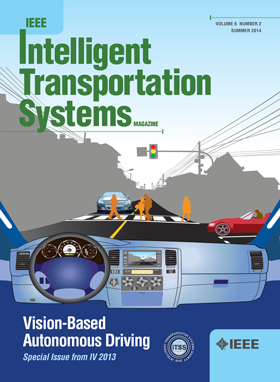Discrete-Time Sliding Mode-Based Finite-Time Trajectory Tracking Control of Underactuated Surface Vessels With Large Sampling Periods
IF 7.9
1区 工程技术
Q1 ENGINEERING, CIVIL
IEEE Transactions on Intelligent Transportation Systems
Pub Date : 2024-09-02
DOI:10.1109/TITS.2024.3449076
引用次数: 0
Abstract
This paper investigates finite-time trajectory tracking control based on discrete-time sliding mode of underactuated surface vessels with compound disturbances comprising model parameter uncertainties and environmental disturbances under large sampling periods. By introducing the second-order Runge-Kutta method without complex operation to discretize the continuous-time vessel model, a high-precision discrete-time model is first obtained to ensure the controller design accuracy in discrete-time systems. Then, a novel finite-time discrete position tracking controller is developed by constructing a coordinate transformation to address the underactuating problem of surface vessels and convert position tracking error into expected velocity command. The compound disturbance is estimated and compensated by a high-order finite-time discrete disturbance observer. The current research on large sampling period control faces the shortcoming of adjusting parameters repeatedly to accommodate varying sampling periods while balancing convergence speed. To address it and enhance control system adaptability to large sampling periods while reducing operating losses and communication burdens on the sensing system, a novel adaptive reaching law is proposed based on existence conditions of the discrete-time sliding mode control system. Given this, a discrete-time sliding mode based finite-time velocity tracking controller is proposed to achieve stable velocity tracking over a large sampling period range. Finally, all tracking errors are demonstrated to converge within a finite time to a small region near zero. Two examples of comparative simulations validate the efficacy of the developed control strategy.基于离散时间滑动模态的大采样周期欠驱动水面船只有限时间轨迹跟踪控制
本文研究了在大采样周期下,由模型参数不确定性和环境扰动组成的复合扰动条件下,基于离散时间滑模的欠驱动水面舰艇有限时间轨迹跟踪控制。通过引入无复杂运算的二阶 Runge-Kutta 方法对连续时间船舶模型进行离散化,首先得到了高精度的离散时间模型,从而保证了离散时间系统的控制器设计精度。然后,通过构建坐标变换来解决水面舰艇的欠驱动问题,并将位置跟踪误差转换为预期速度指令,从而开发出一种新型的有限时间离散位置跟踪控制器。通过高阶有限时间离散扰动观测器对复合扰动进行估计和补偿。目前关于大采样周期控制的研究面临着在平衡收敛速度的同时反复调整参数以适应不同采样周期的缺点。为解决这一问题,增强控制系统对大采样周期的适应性,同时减少传感系统的运行损耗和通信负担,本文提出了一种基于离散时间滑模控制系统存在条件的新型自适应达到律。在此基础上,提出了一种基于离散时间滑动模式的有限时间速度跟踪控制器,以实现大采样周期范围内的稳定速度跟踪。最后,所有跟踪误差都能在有限时间内收敛到接近零的小区域。两个对比模拟实例验证了所开发控制策略的有效性。
本文章由计算机程序翻译,如有差异,请以英文原文为准。
求助全文
约1分钟内获得全文
求助全文
来源期刊

IEEE Transactions on Intelligent Transportation Systems
工程技术-工程:电子与电气
CiteScore
14.80
自引率
12.90%
发文量
1872
审稿时长
7.5 months
期刊介绍:
The theoretical, experimental and operational aspects of electrical and electronics engineering and information technologies as applied to Intelligent Transportation Systems (ITS). Intelligent Transportation Systems are defined as those systems utilizing synergistic technologies and systems engineering concepts to develop and improve transportation systems of all kinds. The scope of this interdisciplinary activity includes the promotion, consolidation and coordination of ITS technical activities among IEEE entities, and providing a focus for cooperative activities, both internally and externally.
 求助内容:
求助内容: 应助结果提醒方式:
应助结果提醒方式:


